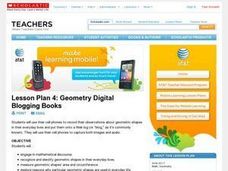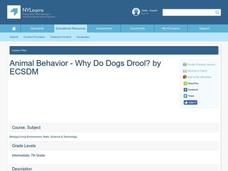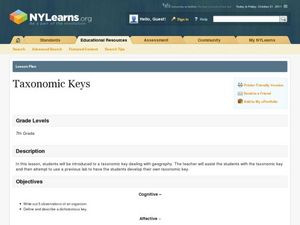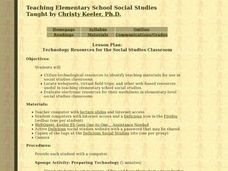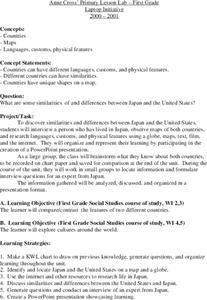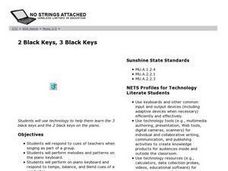Curated OER
Mineral Lab
Eighth graders examine the physical properties of different minerals. In this earth science lesson, 8th graders explain the uses of minerals in their daily lives. They complete the mineral identification table during the lesson.
Curated OER
Weather Elements and Instruments
Eighth graders identify the different weather elements. In this earth science lesson plan, 8th graders explain the difference between relative humidity and dew point. They discuss the different instruments used to predict weather.
Curated OER
Mississippi’s Contribution to Space Exploration
Eighth graders engage in a class discussion while going through a PowerPoint on Mississippi's contribution to space exploration. In this Space science lesson plan, the students will also participate in Brain Pop quizzes where they will...
Curated OER
Mississippi’s Electricity: From Generation to Consumption
Eighth graders discover how electricity is produced. For this physics lesson, 8th graders infer about the future of Mississippi's energy industry. They participate in a Smart Board interactive activity at the end of the lesson.
Curated OER
Chemical Bonding
Eighth graders identify the three main types of chemical bonds. In this chemistry instructional activity, 8th graders draw Lewis dot diagrams of elements and determine the bond formed. They create a model water molecule.
Curated OER
Photosynthesis and Respiration
Eighth graders differentiate photosynthesis and respiration. In this biology lesson, 8th graders draw a diagram explaining these two processes. They answer a quiz after the lesson.
Curated OER
Introduction to Ecology
Eighth graders identify the living and nonliving components of an ecosystem. In this ecology lesson, 8th graders explain the role each organism plays. They participate in class discussion and answer a quiz at the end of the lesson.
Curated OER
Introduction to Biomes
Eighth graders identify the different kinds of biomes. In this life science instructional activity, 8th graders explain their importance in an ecosystem. They take a BrainPop quiz at the end of the instructional activity..
Curated OER
Classification: Dichotomous Key
Young scholars explain the classification process of organisms. In this biology lesson, students practice writing the names of organisms scientifically. They answer the dichotomous key and discuss answers as a class.
Curated OER
Earth History Part II
Eighth graders hypothesize what caused the break up of continents. In this earth science lesson, 8th graders study about the events that took place during Mesozoic and Cenozoic Era. They reconstruct a supercontinent and report their...
Curated OER
Student Voices
Students create a video based on their own interests. In this language arts and technology lesson, students take pictures and compile them so as to create a storyboard on whatever each student wishes. Additionally, students edit...
Curated OER
Keynote Digital Parts of Speech
Students create a parts of speech digital presentation. In this parts of speech lesson, students create a slide show with audio, pictures, movies, and text. They combine their slides to project the entire project.
Curated OER
Geometry Digital Blogging Books
Students observe geometric shapes in their everyday lives. In this middle school/high school mathematics lesson, students use their cell phone to record and publish their observations about the geometric shapes they...
Curated OER
Animal Behavior - Why Do Dogs Drool?
Seventh graders give examples of learned behaviors. In this life science lesson, 7th graders simulate a behavior conditioning experiment. They complete an assessment at the end of the lesson.
Curated OER
Taxonomic Keys
Seventh graders create their own dichotomous key. In this biology lesson, 7th graders classify animals based on their observable features. They explain how to use their dichotomous key.
Curated OER
Technology Resources for the Social Studies Classroom
Looking for ways to increase engagement by bringing technology into your elementary social studies class? Teachers are introduced to the technology resources available for social studies and then they show their students specific...
Curated OER
EU Simulation: The European Council
Discover how government and the European Union works with this interactive activity. Small groups form to represent a country and create a profile. The instructor presents an issue to discuss and potential politicians then develop...
Curated OER
Meet The Instruments Of The Orchestra
Students identify brass, woodwind, string, and percussion instruments and group them into appropriate families in this technology-based Music lesson for 2nd through 5th grades. Each students is required to have a handheld device or laptop.
Curated OER
Bytes: A Summer Byte
Young scholars create a collage from their own digital pictures using Adobe Photoshop Elements. Following a step-by-step instruction guide, students create a collage from pictures of their summer vacation as part of a writing assignment.
Curated OER
Japan
First graders investigate the similarities and differences between Japan and the United States. They develop a KWL chart, locate Japan and the U.S. on a globe, conduct Internet research on life in Japan, conduct an interview, and create...
Curated OER
Poetry in Song
Have your music lovers examine song lyrics and identify the poetry elements or tools used by a lyricist. They review the song individually before working in groups to discuss what they discovered about the song's narrator or character...
Curated OER
Penny Pushing
Fifth graders use an Excel spreadsheet to show them how to enter the amount of pennies they bring each week to school for a fundraising project. They count their pennies each Friday and enter the total amount in the correct columns. In...
Curated OER
Math Hunt
Students, in groups, explore their school to find examples of patterns, geometric shapes, and fractions. They take measurements and make computations of what they find. They record their findings in a spreadsheet, make graphs, and share...
Curated OER
2 Black Keys, 3 Black Keys
Students explore the black keys on the piano and basic music theory techniques using the Internet as a guide. Websites visited include www.PianoNanny.com and musictheory.net.












